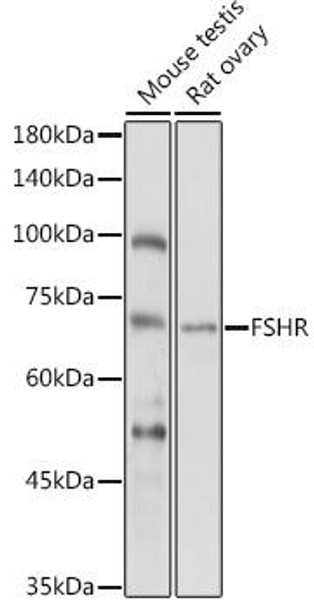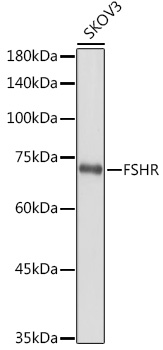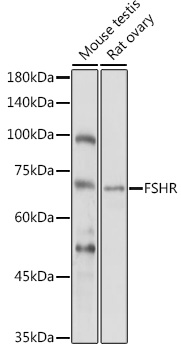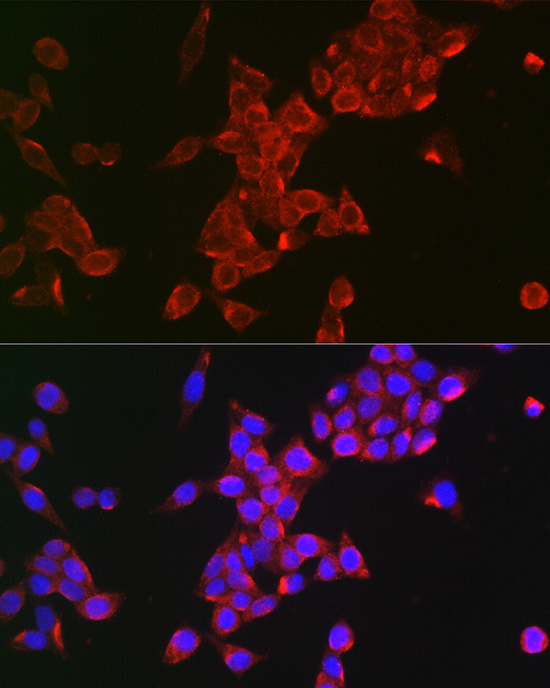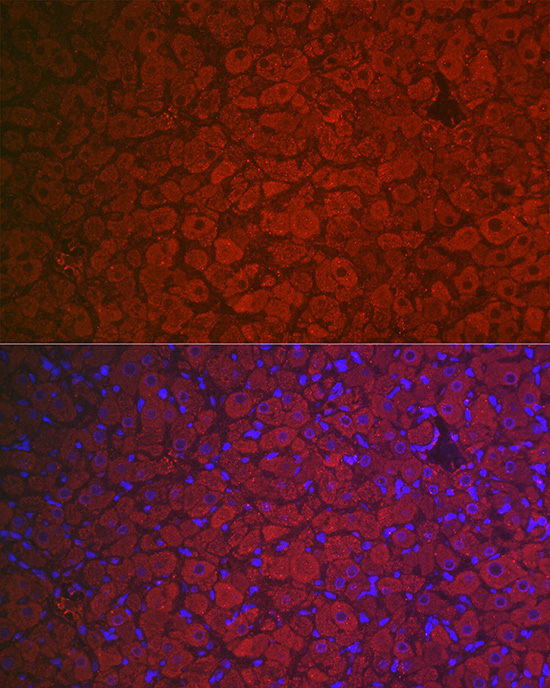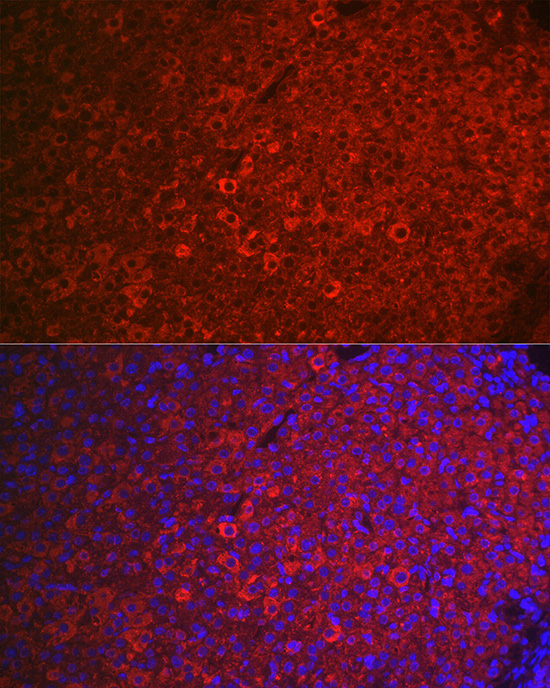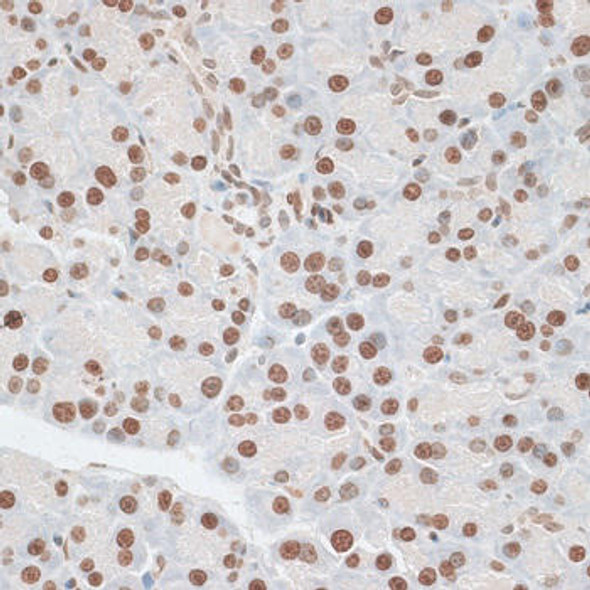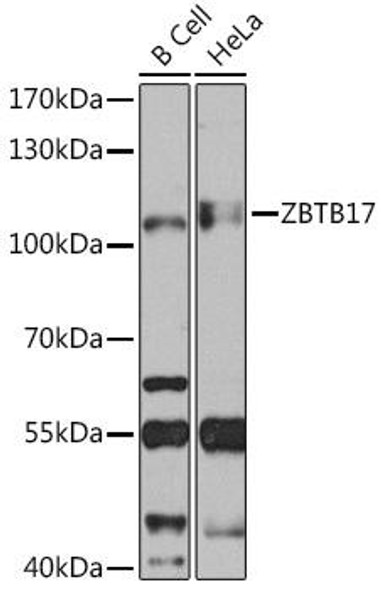Anti-FSHR Antibody (CAB1480)
- SKU:
- CAB1480
- Product type:
- Antibody
- Reactivity:
- Human
- Mouse
- Rat
- Host Species:
- Rabbit
- Isotype:
- IgG
- Antibody Type:
- Polyclonal Antibody
- Research Area:
- Cell Biology
Frequently bought together:
Description
| Antibody Name: | Anti-FSHR Antibody |
| Antibody SKU: | CAB1480 |
| Antibody Size: | 20uL, 50uL, 100uL |
| Application: | WB IF |
| Reactivity: | Human, Mouse, Rat |
| Host Species: | Rabbit |
| Immunogen: | Recombinant fusion protein containing a sequence corresponding to amino acids 631-695 of human FSHR (NP_000136.2). |
| Application: | WB IF |
| Recommended Dilution: | WB 1:500 - 1:2000 IF 1:50 - 1:200 |
| Reactivity: | Human, Mouse, Rat |
| Positive Samples: | SKOV3, Mouse testis, Rat ovary |
| Immunogen: | Recombinant fusion protein containing a sequence corresponding to amino acids 631-695 of human FSHR (NP_000136.2). |
| Purification Method: | Affinity purification |
| Storage Buffer: | Store at -20°C. Avoid freeze / thaw cycles. Buffer: PBS with 0.02% sodium azide, 50% glycerol, pH7.3. |
| Isotype: | IgG |
| Sequence: | KNFR RDFF ILLS KCGC YEMQ AQIY RTET SSTV HNTH PRNG HCSS APRV TSGS TYIL VPLS HLAQ N |
| Gene ID: | 2492 |
| Uniprot: | P23945 |
| Cellular Location: | Cell membrane, Multi-pass membrane protein |
| Calculated MW: | 71kDa/75kDa/78kDa/81kDa |
| Observed MW: | 72KDa |
| Synonyms: | FSHR, FSHR1, FSHRO, LGR1, ODG1 |
| Background: | The protein encoded by this gene belongs to family 1 of G-protein coupled receptors. It is the receptor for follicle stimulating hormone and functions in gonad development. Mutations in this gene cause ovarian dysgenesis type 1, and also ovarian hyperstimulation syndrome. Alternative splicing results in multiple transcript variants. |
| UniProt Protein Function: | FSHR: Receptor for follicle-stimulating hormone. The activity of this receptor is mediated by G proteins which activate adenylate cyclase. Defects in FSHR are a cause of ovarian dysgenesis type 1 (ODG1); also known as premature ovarian failure or gonadal dysgenesis XX type or XX gonadal dysgenesis (XXGD) or hereditary hypergonadotropic ovarian failure or hypergonadotropic ovarian dysgenesis with normal karyotype. ODG1 is an autosomal recessive disease characterized by primary amenorrhea, variable development of secondary sex characteristics, and high serum levels of follicle-stimulating hormone (FSH) and luteinizing hormone (LH). Defects in FSHR are a cause of ovarian hyperstimulation syndrome (OHSS). OHSS is a disorder which occurs either spontaneously or most often as an iatrogenic complication of ovarian stimulation treatments for in vitro fertilization. The clinical manifestations vary from abdominal distention and discomfort to potentially life-threatening, massive ovarian enlargement and capillary leak with fluid sequestration. Pathologic features of this syndrome include the presence of multiple serous and hemorrhagic follicular cysts lined by luteinized cells, a condition called hyperreactio luteinalis. Belongs to the G-protein coupled receptor 1 family. FSH/LSH/TSH subfamily. 3 isoforms of the human protein are produced by alternative splicing. |
| UniProt Protein Details: | Protein type:Receptor, GPCR; Membrane protein, multi-pass; GPCR, family 1; Membrane protein, integral Chromosomal Location of Human Ortholog: 2p21-p16 Cellular Component: plasma membrane; integral to membrane Molecular Function:protein binding; follicle-stimulating hormone receptor activity Biological Process: G-protein coupled receptor protein signaling pathway; gonad development; follicle-stimulating hormone signaling pathway; male gonad development; female gamete generation; spermatogenesis; female gonad development Disease: Ovarian Hyperstimulation Syndrome; Twinning, Dizygotic; Ovarian Dysgenesis 1 |
| NCBI Summary: | The protein encoded by this gene belongs to family 1 of G-protein coupled receptors. It is the receptor for follicle stimulating hormone and functions in gonad development. Mutations in this gene cause ovarian dysgenesis type 1, and also ovarian hyperstimulation syndrome. Alternative splicing results in multiple transcript variants. [provided by RefSeq, Mar 2010] |
| UniProt Code: | P23945 |
| NCBI GenInfo Identifier: | 311033420 |
| NCBI Gene ID: | 2492 |
| NCBI Accession: | P23945.3 |
| UniProt Secondary Accession: | P23945,Q05AH0, Q16225, Q4QRJ3, Q4ZFZ2, Q53RW2, A8K947 G5CBS7, G5E967, J3KQ00, |
| UniProt Related Accession: | P23945 |
| Molecular Weight: | 695 |
| NCBI Full Name: | Follicle-stimulating hormone receptor |
| NCBI Synonym Full Names: | follicle stimulating hormone receptor |
| NCBI Official Symbol: | FSHR |
| NCBI Official Synonym Symbols: | LGR1; ODG1; FSHRO |
| NCBI Protein Information: | follicle-stimulating hormone receptor; FSH receptor; follitropin receptor |
| UniProt Protein Name: | Follicle-stimulating hormone receptor |
| UniProt Synonym Protein Names: | Follitropin receptor |
| Protein Family: | Follicle-stimulating hormone receptor |
| UniProt Gene Name: | FSHR |
| UniProt Entry Name: | FSHR_HUMAN |

